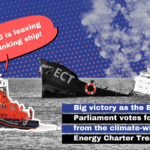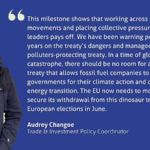The 24 board members of the Green Climate Fund (GCF) finally met in Geneva on August 24th. After a five-month delay, the board met to work out the details of how the fund will operate, where its headquarters will be and how the money in the pot will be distributed. Now the biggest unresolved problem is filling the pot. Currently there are no concrete pledges other than the general agreement made by all UNFCCC parties in Copenhagen to provide $100 billion a year from 2015.
“We are massively concerned about the funding gap,” said Meera Ghani, Senior Policy Officer for Climate Finance at CAN Europe. “If countries don’t put any money in there won’t be anything to disperse,“ Ghani concluded.
CAN Europe is asking for developed countries to pledge at least $10-15 billion in new and additional public finance from now until 2015.
During the meeting the board made some progress towards finding a country to host the GCF, though the issue was not decided there. The board is expected to make a decision at a meeting scheduled for mid-October in time to report back at the UNFCCC COP being held in Qatar in November. Germany, Mexico, Namibia, Poland, South Korea and Switzerland are all vying to host the fund’s new headquarters.
The GCF was hailed as one of the few successes to come out of the UN climate negotiations in recent years. It was operationalised at the UN talks in Durban in 2011 with the aim of providing support to developing nations in order for them to both reduce their greenhouse gas emissions and adapt to the impacts of climate change.
It is crucial that the GCF is up and running before 2015 when countries are committed to signing a new global agreement.



